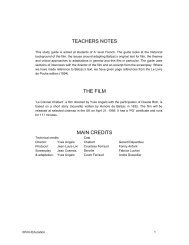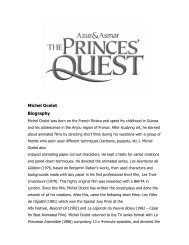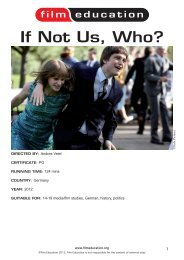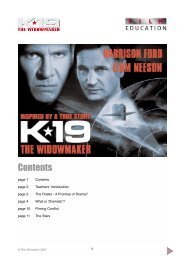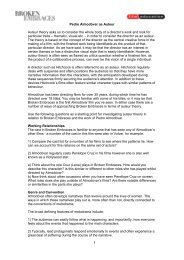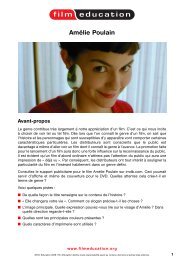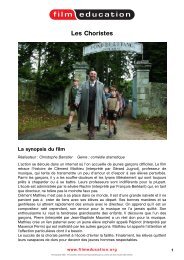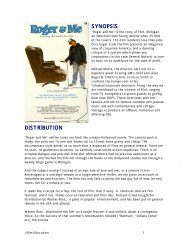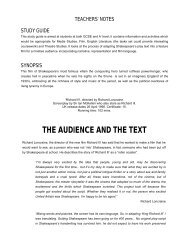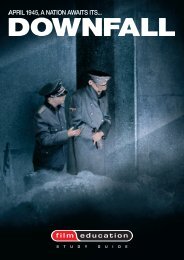Bullet Boy - Film Education
Bullet Boy - Film Education
Bullet Boy - Film Education
Create successful ePaper yourself
Turn your PDF publications into a flip-book with our unique Google optimized e-Paper software.
TASK<br />
■ What are the advantages and disadvantages of encouraging an audience to believe that an<br />
actor is playing himself on screen?<br />
REALISM AND AUTHENTICITY<br />
Much of the success of <strong>Bullet</strong> <strong>Boy</strong> depends on its convincing an audience that its plot, location<br />
and characters are ‘realistic’ in a way in which they are not in films such as ‘Spiderman’, ‘Lord<br />
of The Rings’ or a James Bond movie. Yet these films create their own ‘reality’ for an audience<br />
which will be disconcerted or puzzled if the accepted ‘rules’, frequently generic conventions, are<br />
subverted in some fashion.<br />
For example, we accept that Spiderman’s ability to climb up walls derives from the fact that he<br />
was bitten by a genetically modified spider rather than from the magic slippers he was given by<br />
the goddess Athena. Similarly, Gandalf does not defeat Sauron through his easy access to<br />
nuclear weapons or to the years he spent studying at the feet of an ancient Buddhist martial<br />
arts expert. And James Bond’s unerring ability to seduce women and thwart attempts to<br />
dominate the world are in no way due to the magic ring he was given by his fairy godmother.<br />
Such films are worlds away from a ‘realistic’ TV series such as EastEnders which is firmly<br />
located in a world from which magic and androids from the future have been banished.<br />
However, long lost relations reappear, the believed-to-be-dead return to the series and nobody<br />
ever switches on the television to find that Coronation Street or, even less probable,<br />
EastEnders is on!<br />
Saul Dibb was anxious to ensure that his film should be as ‘realistic’ as possible. He has a<br />
background in documentary filmmaking so is used to doing research. He visited the Dalston<br />
Youth Project in Hackney and discussed his project with the teenagers there. ‘I tried to<br />
persuade people to talk to me, openly, which obviously was a difficult thing to do given the fact<br />
that some of them were involved in the whole gun thing,’ he says. ‘It was amazing to discover<br />
how their lives were in some ways very naïve, very innocent, at the same time they’d seen<br />
terrible things happen to them or their families.’<br />
Local residents were recruited as actors to give a sense of authenticity, in terms of how they<br />
look, act (i.e. move) and most importantly, how they speak. Slang and patois, e.g. ‘Stupidness,<br />
innit, bredren, sometink’, are spoken throughout the film to emphasise authenticity/credibility of<br />
the dialogue, even at the risk of offering the ‘outsider’ a slightly stereotyped view of ‘black youth’.<br />
Author Catherine Johnson worked with Dibb on the script. Johnson, then writer-in-residence at<br />
Holloway Women’s Prison, has lived in and around Hackney for most of her life. ‘Working with<br />
Catherine was great, she’s very good with kids and doesn’t find it difficult to see the world from<br />
a kid’s perspective,’ says Dibb.<br />
www.filmeducation.org 5



